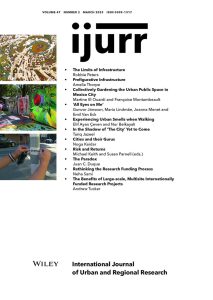There are a number of benefits to large-scale, multi-site, internationally funded urban research projects if they are operationalized in ways that acknowledge forms of knowledge incommensurability and allow for space to explore the commensurability of different forms of knowledge across different geographies. Such projects are especially important in the context of the precarity of research funding, as such projects can provide the space to explore new urban research avenues that may not have formed core components of the existing urban studies canon and may also bring with them significant and new funding possibilities. In this intervention I use the example of the GCRF-funded PEAK Urban programme to consider how new urban research questions related to sexuality and health were brought to the fore during the life of the programme, which offer not only new research avenues, but also potential access to significant new funding sources. Programmes such as PEAK Urban therefore have the potential to build the long-term resilience of urban research. Cutting funding to such programmes may therefore limit the efficacy of the programmes themselves and the long-term sustainability of urban scholarship.

